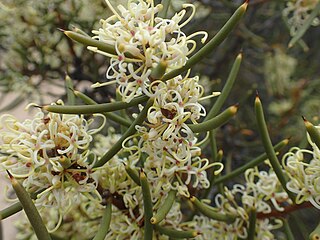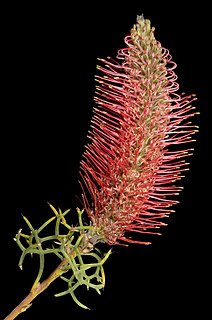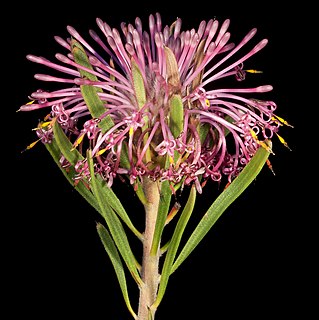
Lambertia is a genus of flowering plants, belonging to the family Proteaceae. It is endemic to Australia. The genus was named in 1798 by Sir James Edward Smith in honour of English botanist Aylmer Bourke Lambert.

Grevillea armigera, also known as prickly toothbrushes or thorny grevillea, is an erect shrub or tree which is endemic to the south-west of Western Australia. The species was formally described by Swiss botanist Carl Meissner in 1856.

Aphanopetalum is a genus of twining shrubs or vines in the family Aphanopetalaceae which are endemic to Australia.

Grevillea manglesii is a shrub which is endemic to an area around Perth in Western Australia. It usually grows to around 3 metres in height and 4 metres in width and produces white flowers throughout the year.

Verticordia is a genus of more than 100 species of plants commonly known as featherflowers, in the myrtle family, Myrtaceae. They range in form from very small shrubs such as V. verticordina to trees like V. cunninghamii, some spindly, others dense and bushy, but the majority are woody shrubs up to 2.0 m (7 ft) tall. The flowers are variously described as "feathery", "woolly" or "hairy" and are found in most colours except blue. They often appear to be in rounded groups or spikes but in fact are always single, each flower borne on a separate stalk in a leaf axil. Each flower has five sepals and five petals all of a similar size with the sepals often having feathery or hairy lobes. There are usually ten stamens alternating with variously shaped staminodes. The style is simple, usually not extending beyond the petals and often has hairs near the tip. All but two species are found in Southwest Australia, the other two occurring in the Northern Territory.

Acidonia microcarpa is a species of shrub in the plant family Proteaceae. It is the only species in the genus Acidonia. It is endemic to the south coast of the Southwest Botanic Province of Western Australia.
Banksia gardneri var. gardneri is a variety of Banksia gardneri. As an autonym, it is defined as encompassing the type material of the species. It is native to the Southwest Botanical Province of Western Australia.

Grevillea integrifolia, commonly known as entire-leaved grevillea, is a shrub that is endemic to the south west of Western Australia.

Grevillea ilicifolia, commonly known as holly grevillea, is a species of the plant genus Grevillea. It is a shrub of variable form, growing to between 0.3 and 2 metres in height and 3 metres wide. Typically, leaves are lobed and holly like, but may also be unlobed. The flowers have perianths that have a base that is cream to green grading to grey-mauve. Styles may be pink, red, orange or yellow. The main flowering period in the species' native range is September to November.

Hakea pandanicarpa is a shrub species in the family Proteaceae. It is endemic to south-west Western Australia.

Hakea preissii, commonly known as the needle tree, needle bush and Christmas hakea, is a shrub or tree of the genus Hakea native to Western Australia. The Noongar name for the plant is Tanjinn.

Grevillea paradoxa, commonly known as the bottlebrush grevillea, is a shrub of the genus Grevillea native to an area in the Mid West, Wheatbelt and Goldfields-Esperance regions of Western Australia.
Grevillea phanerophlebia, commonly known as the prominent vein grevillea and the vein leaf grevillea, is a shrub of the genus Grevillea native to a small area on the west coast in the Mid West region of Western Australia.
Grevillea rara, also known as the rare grevillea, is a shrub of the genus Grevillea native to a small area in the South West region of Western Australia.
Grevillea rudis is a shrub of the genus Grevillea native to an area along the west coast in the Wheatbelt region of Western Australia.
Enekbatus clavifolius is a shrub endemic to Western Australia.
Enekbatus cryptandroides is a shrub endemic to Western Australia.
Enekbatus stowardii is a shrub endemic to Western Australia.

Isopogon linearis is a small shrub in the family Proteaceae that is endemic to the southwest of Western Australia.
Malcolm Eric Trudgen is a West Australian botanist. He has published some 105 botanical names. He currently runs his own consulting company, ME Trudgen and Associates.











